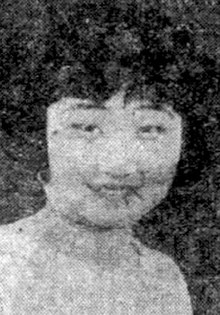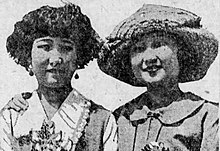Nora Hsiung Chu
Nora Hsiung Chu | |
|---|---|
 Nora Hsiung as a young student, from a 1923 newspaper | |
| Born | 1902 |
| Died | 1977 (aged 74–75) |
| Other names | Tze Hsiung Chu, Chih Hsiung, Chu Hsiung-chih, N. T. H. Chu, Xiong Zhi, Nora Xiong |
| Alma mater | Barnard College (BA) Columbia University (MA) |
| Occupation | educator |
| Children | 5 |
| Parent | Xiong Xiling |
Nora Tze Hsiung Chu (1902 – 1977) was a Chinese educator. As secretary general of the National Association for Refugee Children in the 1940s, she oversaw dozens of orphanages and programs for child refugees in China.
Early life
[edit]Hsiung was born in Hunan province in 1902 (some sources give 1900 as the date),[1] the daughter of Chinese philanthropist and politician Hsiung Shi-ling (Xiong Xiling). Her mother, Chu Ch'i-hui (Zhu Qihui), was a leader of women's and charitable organizations.[2][3] After her mother died in 1931, her father married Mao Yen-wen (1898–1999).[4]

Nora Hsiung and her sister Rose were educated in the United States.[5] Nora attended Mount Ida School, Mount Holyoke College[6][7] and Barnard College.[8][9] While in Boston, she was in the cast of two short plays produced by Chinese students to benefit Chinese relief work.[10] While she was in New York City, she was photographed doing carpentry ahead of the 1925 Oriental Bazaar, a benefit for the Cathedral of St. John the Divine.[11] She received a bachelor's degree at Barnard in 1926; she also earned a master's degree in 1927 from Teachers College Columbia University.[12][3]
Career
[edit]On her return to China, Nora Hsiung Chu served on the staff of the National College of Rural Reconstruction.[3] She toured European and American child welfare programs and gave a series of lectures in China about what she found, and how Western ideas might be adapted for Chinese use.[13]
In 1942, Chu became secretary general of the National Association for Refugee Children, an organization directed by Soong Mei-ling and based in Chongqing during and after World War II.[12] Chu was responsible for overseeing dozens of orphanages, schools, and programs for child refugees.[14][15][16] She was described as "the leading Chinese child-welfare specialist" after she chaired a national conference in Shanghai in 1946.[17] She went to the United Kingdom on a United Nations fellowship in 1949.[18]
Chu was living in Taiwan when she served on the United Nations Commission on the Status of Women when it met in Geneva, Switzerland in 1956.[19] Later that year, she crossed the United States, visiting educators in New York City, Washington, D.C., Cincinnati, West Lafayette, Berkeley, and Seattle along the way.[18] In 1967, Chu attended the World Girl Guide Association meeting in Canada.[20] She participated in the Regional Meeting of Teacher Educators in Asia, held in The Philippines in 1969.[21]
Personal life
[edit]Nora Hsiung married Chu Ling (also known as Lynn Chu), a Chinese air force officer. They had five children;[18][22] four of their children lived their adult lives in the United States, and the fifth lived in Taiwan.[23][24] Her husband was director of the Astronautical Society of the Republic of China, and was involved in international meetings on the "peaceful uses of space".[25][26] She died in 1977, aged 75 years.[27]
Her younger sister, Rose Hsiung, married British author Robert Payne in 1942; they divorced in 1951.[28] Her granddaughter Linda Hsiung Dech[24] was a founder of the Minnesota Breastfeeding Coalition, and in 2019 became executive director of the Minnesota Milk Bank for Babies.[29][30]
References
[edit]- ^ China Handbook. Macmillan. 1937. pp. xxvii.
- ^ Yu-ning, Li (1991-12-01). "Chu Ch'i-hui and Her Family". Chinese Studies in History. 25 (2): 66–87. doi:10.2753/CSH0009-4633250266. ISSN 0009-4633.
- ^ a b c Hayford, Charles Wishart (1990). To the People: James Yen and Village China. Columbia University Press. pp. 49–51, 193. ISBN 9780231072045.
- ^ Lee, Lily Xiao Hong (2016-07-08). Biographical Dictionary of Chinese Women: v. 2: Twentieth Century. Routledge. p. 400. ISBN 9781315499246.
- ^ "Flapper Revolution for China". The Evening News. July 7, 1922. p. 8. Retrieved November 5, 2019 – via Newspapers.com.
- ^ College, Mount Holyoke Seminary and; Seminary, Mount Holyoke Female (1917). Annual Catalogue of the Mt. Holyoke Seminary and College in South Hadley, Mass. Mount Holyoke College. p. 127.
- ^ "Chinese Equestrienne". The Marion Star. May 31, 1922. p. 12. Retrieved November 5, 2019 – via Newspapers.com.
- ^ "Personal News". The Chinese Students Monthly. 20: 74. December 1924.
- ^ "Here's a Student from the Land of the Dragon" Boston Globe (October 14, 1923): 102. via Newspapers.com
- ^ "Two Plays by Chinese Students". The Boston Globe. February 27, 1921. Retrieved November 5, 2019.
- ^ "She's Carpenter". Santa Ana Register. April 30, 1925. p. 5. Retrieved November 5, 2019 – via Newspapers.com.
- ^ a b China Year Book. China Publishing Company. 1947. pp. 615, 657.
- ^ Tillman, Margaret Mih (2018-10-02). Raising China's Revolutionaries: Modernizing Childhood for Cosmopolitan Nationalists and Liberated Comrades, 1920s-1950s. Columbia University Press. pp. 132, 147. ISBN 9780231546225.
- ^ "Those China-Girl Nurses". Muncie Evening Press. April 20, 1944. p. 10. Retrieved November 4, 2019 – via Newspapers.com.
- ^ "Colossal Child Care Task is Faced in China". Statesman Journal. June 27, 1945. p. 4. Retrieved November 4, 2019 – via Newspapers.com.
- ^ "Director of Orphanages Pleads for Trained Workers". News of United China Relief: 7. January 8, 1944 – via Internet Archive.
- ^ Price, Mildred (January 1947). "For Welfare of Chinese Children". The Child: Monthly News Summary: 123.
- ^ a b c Elliott, Kathleen (July 17, 1956). "Chinese Education Leader Plans to Use Craftwork in Teaching". Journal and Courier. pp. 4, 9. Retrieved November 5, 2019 – via Newspapers.com.
- ^ "Moscow Takes Over a Seminar". The Decatur Daily Review. September 1, 1956. p. 4. Retrieved November 4, 2019 – via Newspapers.com.
- ^ Flexman, Muriel (September 26, 1967). "Understanding is Key". The Ottawa Citizen. p. 38. Retrieved November 4, 2019 – via Newspapers.com.
- ^ ERIC (1970). ERIC ED041860: Curriculum Development in Teacher Education in Asia. Final Report of the Regional Meeting of Teacher Educators in Asia. (Quezon City, P.I., Sept. 23-Oct 3. 1969).
- ^ "Untitled news item". Oklahoma City Star. September 14, 1945. p. 4. Retrieved November 5, 2019 – via Newspapers.com.
- ^ "Jack W. Chu". The Morning Call. June 18, 2003. p. 25. Retrieved November 4, 2019 – via Newspapers.com.
- ^ a b "Hugo S. W. Hsiung". Pioneer Press. August 8, 2018. Retrieved November 4, 2019.
- ^ Congress, United States. Reports and Documents. p. 1277.
- ^ "General from Formosa Talks at Junior High". The San Bernardino County Sun. 1963-11-22. p. 15. Retrieved 2019-11-05 – via Newspapers.com.
- ^ Shi, Xia (2018-03-20). At Home in the World: Women and Charity in Late Qing and Early Republican China. Columbia University Press. ISBN 9780231546232.
- ^ McDowell, Edwin (1983-02-22). "Robert Payne, Author, Dies at 71; Published More Than 100 Books". The New York Times. ISSN 0362-4331. Retrieved 2019-11-04.
- ^ "Announcing New Leadership Team". Minnesota Milk Bank For Babies. August 27, 2019. Retrieved 2019-11-05.
- ^ "Our Team". Minnesota Milk Bank For Babies. Retrieved 2019-11-05.
